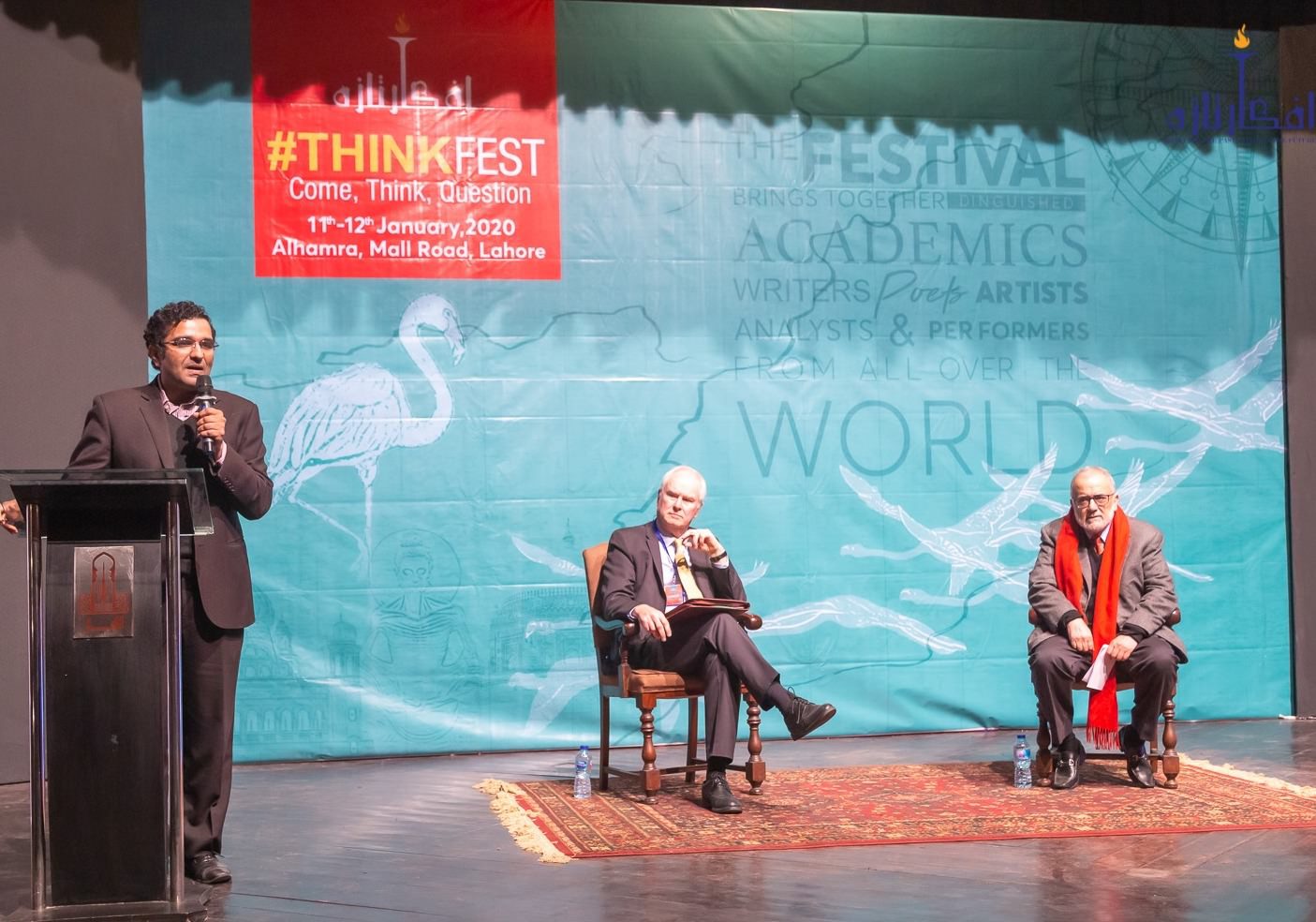
Yaqoob Bangash (left) at the 2020 ThinkFest in Lahore, Pakistan. Photo courtesy Dr. Bangash.
The Mittal Institute welcomes Yaqoob Khan Bangash as the 2022-23 United States Educational Foundation in Pakistan (USEFP) Fulbright Fellow. A historian of Modern South Asia, Dr. Bangash is Associate Professor, Department of Governance and Global Studies and Director, Centre for Governance and Policy at Information Technology University, Lahore, Pakistan. He studies Pakistan as a post-colonial state – its state formation, identity, and conflicts. Dr. Bangash is the author of A Princely Affair: Accession and Integration of Princely States in Pakistan, 1947-55 and in 2016 founded the first academic literary festival in Pakistan, the ‘Afkar-e-Taza ThinkFest,’ which attracted over 25,000 people in 2020. We caught up with Dr. Bangash to learn more about his plans for the upcoming year.
Mittal Institute: Congratulations on the Fulbright, Yaqoob! You were a Research Affiliate with LMSAI last year, and we are excited about your transition to a Fulbright Fellow this year. Can you talk to us about why you decided to pursue this program, and why the Mittal Institute?
Yaqoob Khan Bangash: I worked on the Partition Project led by Professor Jennifer Leaning at the Mittal Institute a few years ago, which was a great experience. My focus until then had been modern Pakistan, but working on the project led me to realize that several aspects of the Partition of the Punjab in 1947 were still understudied. That project led to three academic articles, one of which is published, one has been accepted by a journal, and one is in the final stages of revision.
I already had a good working relationship with the Mittal Institute, so I decided to explore the possibility of spending my Fulbright Fellowship at the Institute as soon as I was offered. I was delighted, and thankful, when both Professor Tarun Khanna and the former Executive Director, Meena Hewitt, were keen to host me. Since then the staff at the Institute, especially Danielle Wallner and Selmon Rafey, have been very kind and helpful in the process.
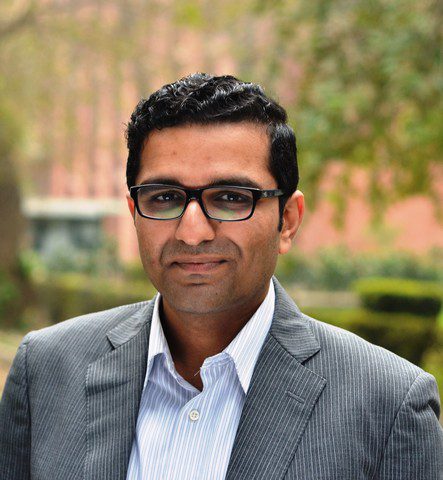
Yaqoob Bangash, 2022-23 United States Educational Foundation in Pakistan (USEFP) Fulbright Fellow.
Harvard has one of the best libraries in the world and many pre-eminent minds, and I hope to be able to tap into and learn from them during my time here. It is indeed exhilarating to be at such an intellectual stimulating environment, and I am thrilled to be here!
Mittal Institute: What are your research plans for the upcoming year? What are you most excited for, with your residence at Harvard?
Yaqoob Khan Bangash: At my home university I had several administrative positions lately: Head of Department, Director External Linkages, and even a stint as Acting Treasurer! This meant that I had little time to focus on my own academic work. Thus, the main reason for coming on this fellowship was to escape the often thankless administrative tasks and focus on my own research.
My plan at the Mittal Institute is to continue my research into the legal history in Pakistan. During the first half of the fellowship, I hope to finish the history of the Lahore High Court—a project I have been working on for several years now. The development of the modern judiciary is one of the lasting legacies of the British Raj in South Asia. In fact, the judiciary was the only part of the Raj to have continued unchanged in the post-independence period. Thus, this work assesses the over 150 years’ history of the superior judiciary in the Punjab, focusing on its organization, development, and most importantly, impact on the people of the province. Then in the second half I will continue working on my next monograph on the first constitution of Pakistan.
I hope that during my time here I am not only able to continue my own research, but also contribute to the Institute by helping organize programming on Pakistan. There is a lot to question, understand and appreciate about Pakistan, now in its 75th year of independence, and I hope I can further research on the country during my time here. I have several ideas and I hope some of them will collaboratively come to fruition.
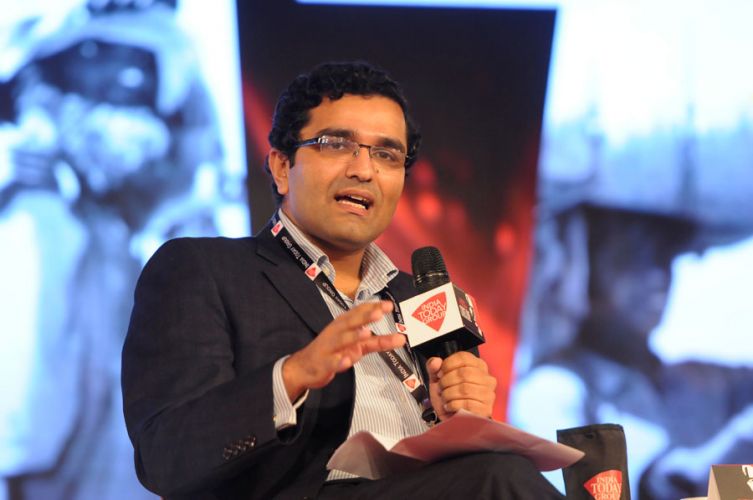
Dr. Bangash speaks at a 2016 India Today Conclave, a summit that gathers global thought leaders. | By Ramesh Sharma.
Mittal Institute: As a scholar on Pakistan as a post-colonial state, you are also working on a monograph on the imagination of Pakistan as a country after its creation. How is that coming, and how can our community learn more about that work?
Yaqoob Khan Bangash: When Pakistan was created in August 1947 it was a fascinating country: it was the first modern country founded on the basis of religion; was the world’s largest Muslim country; and was a country composed of two wings, separated by over a thousand miles of what soon became enemy territory. Thus, it was not going to be an easy task to formulate a constitution for such a country. No wonder then it took nine long years, 1947-56, to agree on a draft, and even then, it was summarily thrown out in less than three years!
While there is a lot of literature on the creation of Pakistan, there is very little comparatively on the period immediately after its creation, the ‘formative phase’ as put by Prof. Khalid Bin Sayeed. My research refocuses on this earlier critical period and investigates how the Constituent Assembly of Pakistan grappled with issues like the status of religion, democracy, minority rights, ethnic tensions, etc. Unsurprisingly, many of these issues are still important in Pakistan, and in fact, most Muslim countries around the world, and during my time at Harvard I hope to probe these issues further.
I have already conducted some research on the topic and a paper on the question of sovereignty in the Constituent Assembly has already been published. During my fellowship, I hope to write up chapters on issues related to minorities and east and west Pakistan tensions.
Mittal Institute: You are the brainchild behind Afkar-e-Taza ThinkFest – an event in Pakistan that brings academia and the general public together to ponder pressing issues. What led you to develop this event, and what has it meant to you personally and for Pakistan? How can we learn more about the 2022 installment?
Yaqoob Khan Bangash: The ThinkFest was born due to the real dearth of academia’s interaction with the public in Pakistan. There was literally no avenue for academics to interact with a broader audience; even within academia, echo chambers were becoming the norm. Furthermore, with the rise of extremism, terrorism, and other fissures in society, there was a great need to enable a broader engagement of academic discourse with society so that we are able to create a more ‘Thinking’ Pakistan.
Since its inception in 2016, and despite a shoestring budget, the ThinkFest has made its mark on the academic and cultural landscape in Pakistan. Very quickly it distinguished itself by inviting top academics from around the world—including several Nobel Laureates, which dramatically increased academic-led discourse in Pakistan. Many of our speakers had never been to Pakistan, and many of our in-country speakers had never interacted with even their compatriots; hence, the ThinkFest soon became a meeting place for all scholars, national and international. We also never kept a distance between our speakers and the general public. As is common in many literary festivals, we have never had a ‘speakers lounge,’ where the speakers hide from the public gaze. This very public interaction has become one of the most important successes of the ThinkFest, which, coupled with our focus on multilingualism in all our sessions, has really removed barriers of class, language and background, and democratized the space—the only place in Pakistan to do so!
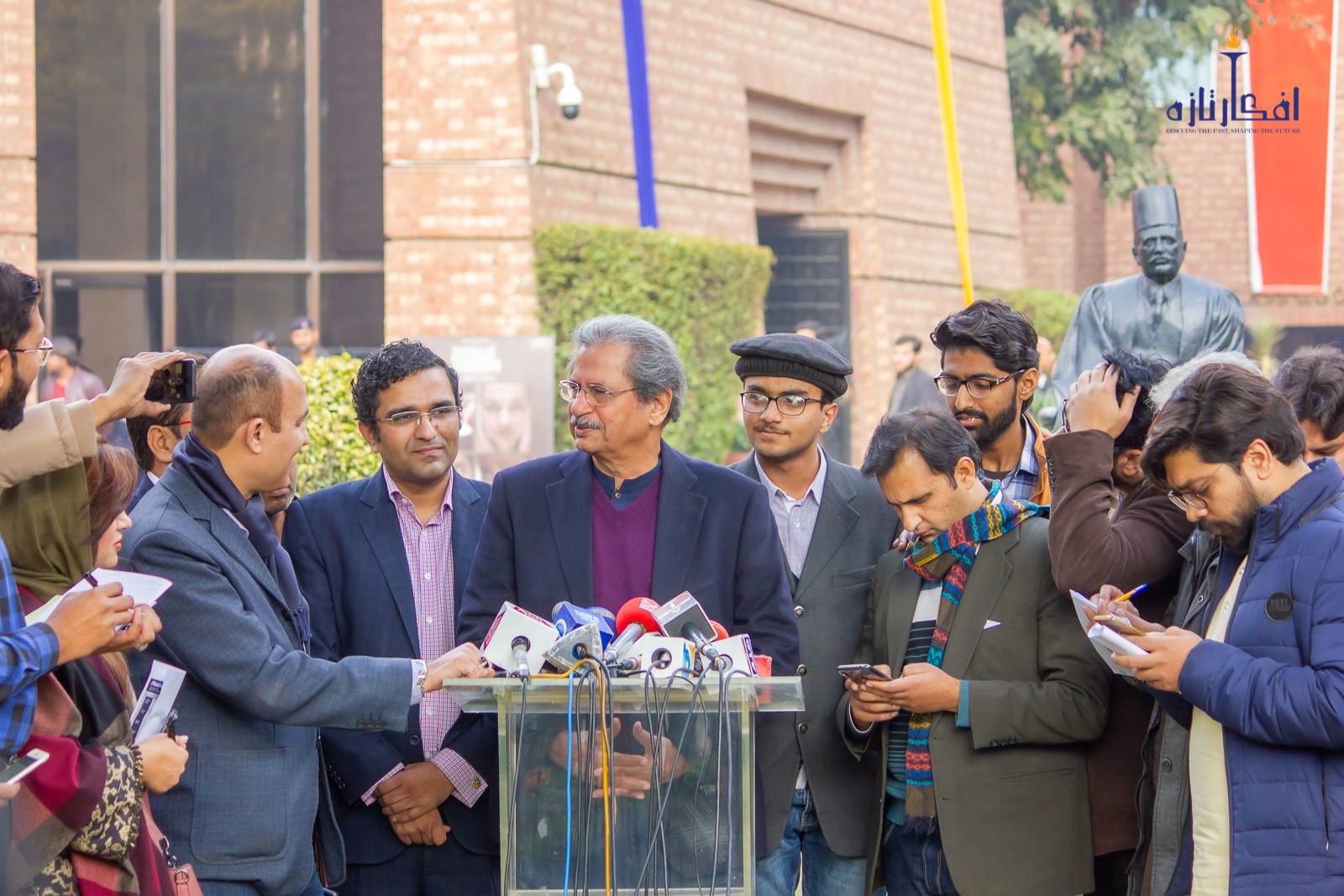
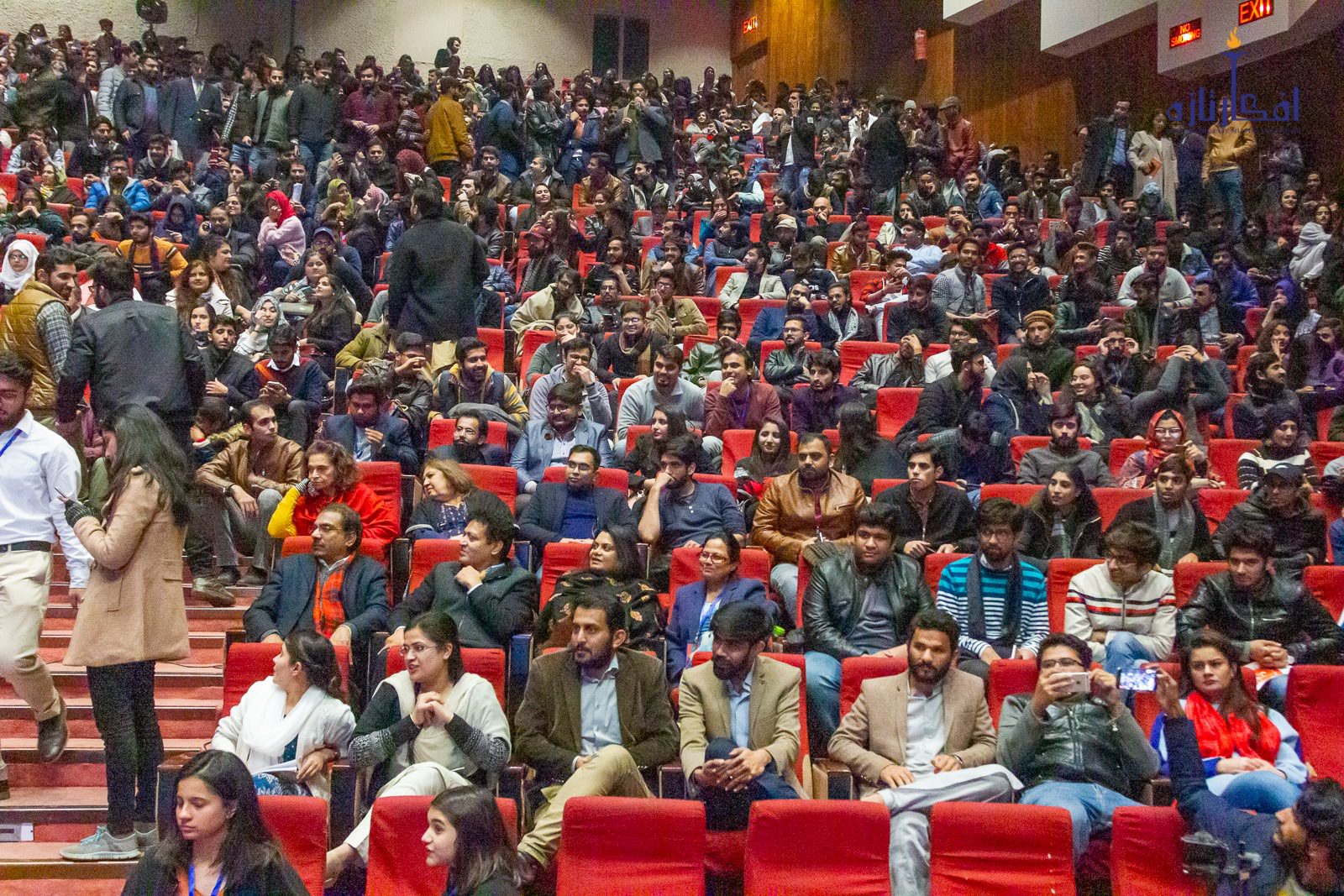
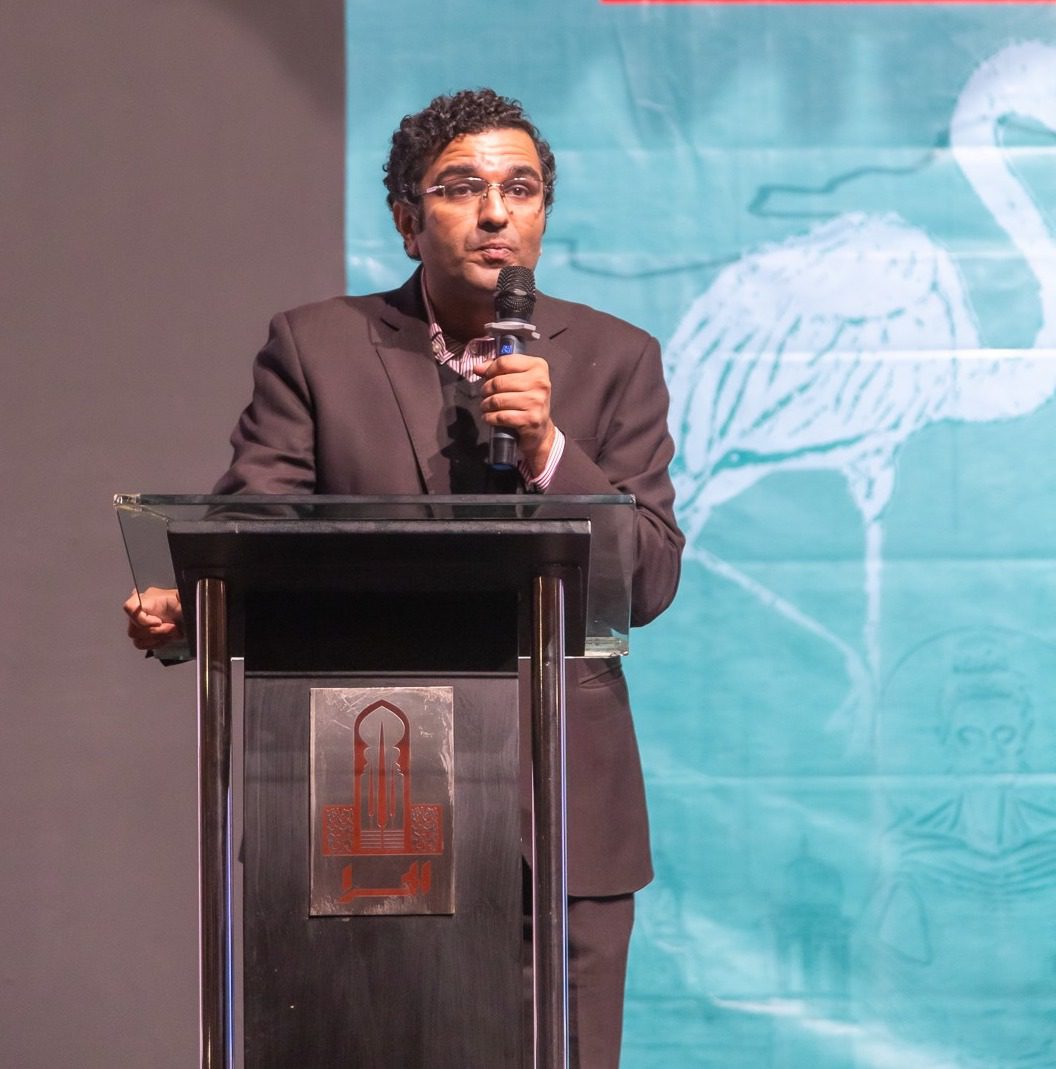
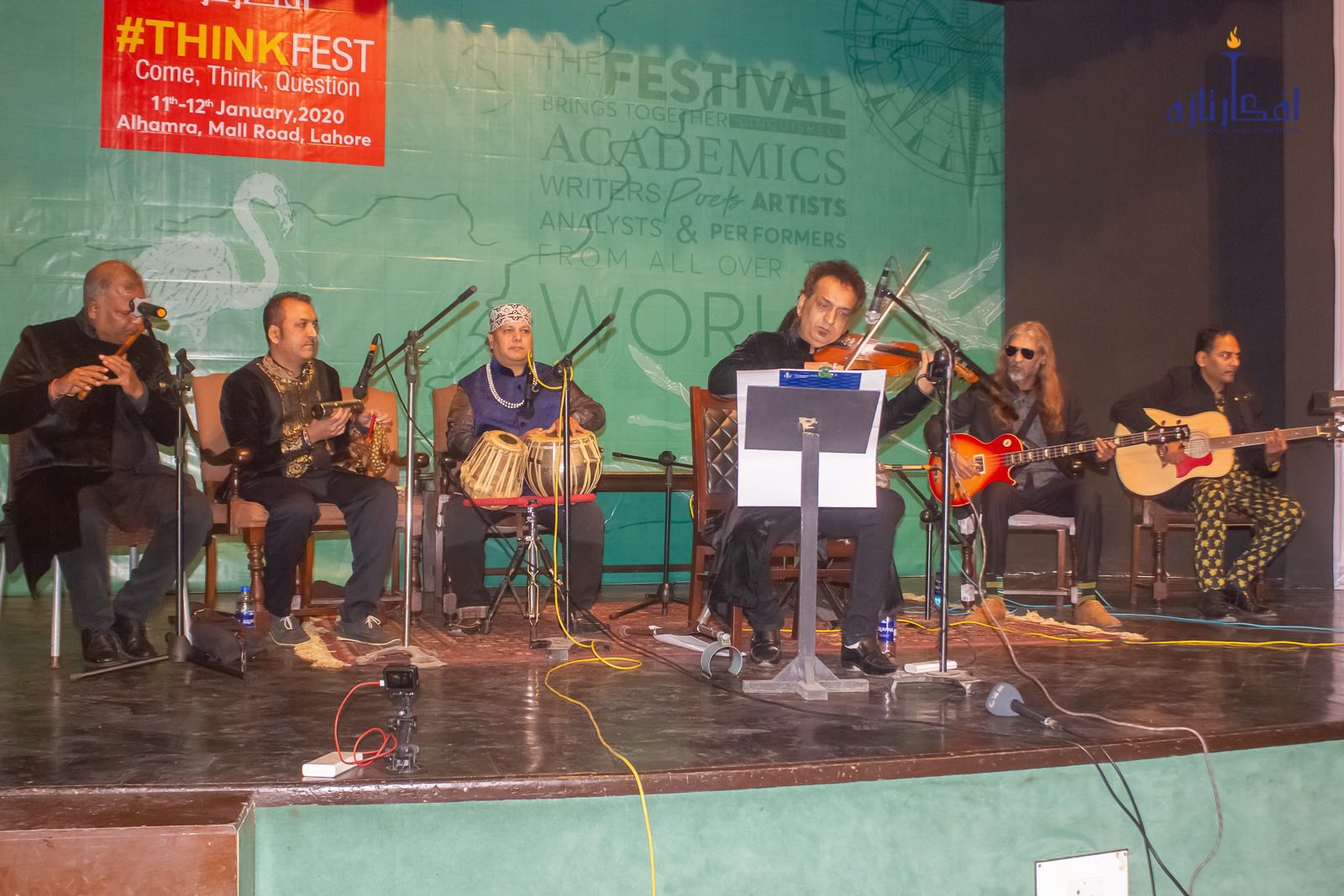
ThinkFest 2020 images (clockwise, from left): Dr. Yaqoob Bangash, second from left, at a ThinkFest podium session; a view of the crowd; Dr. Bangash speaks in Lahore; ThinkFest features artistic performances, in addition to lectures and seminars.
The ThinkFest has also brought the idea of the ‘Speakers Corner’ from London’s Hyde Park to Lahore. This space – where anyone can speak on anything – has over the years become an amazing melting pot of ideas and conversations. From topics considered taboo in Pakistan, to giving budding artists a chance to sing, dance, or read poetry, this space has given the young people of Pakistan, a safe and open platform to express themselves.
After a digital 2021 edition due to Covid, the ThinkFest will return for a physical edition in Lahore later this year. The ThinkFest Committee, composed of leading thinkers, writers and entrepreneurs, is currently in the thick of inviting speakers, and I hope I can use my time at the Mittal Institute and Harvard to convince some speakers from here to join us. This could be a very exciting area of collaboration.
Mittal Institute: You are a contributing author to a number of news outlets – The Express Tribune, Daily Times, and The News, to name a few. Why is it important to you to pen these pieces, most of which are reflections on Pakistan’s state of affairs?
Yaqoob Khan Bangash: Very few academics write for newsmedia in Pakistan, and like the ThinkFest, writing for such publications is my attempt to engage academia with the popular discourse. Being a historian, I used to get annoyed when media personnel would get historical facts wrong, let alone their analysis. I would then write grumpy letters to the editor correcting glaring errors. Then one day an editor suggested that I write an op-ed based on where I saw current affairs could use a historical perspective. Several years down the line I continue to do so, and the several emails I receive after publishing my columns at least show that some one is reading them! This kind of public engagement challenges academics who are often so comfortable in their ‘ivory tower,’ to interact and learn from the public and I really hope more academics follow suit.
Mittal Institute: What is next for you after your Fulbright – do you have any publications in the works or other research plans?
Yaqoob Khan Bangash: I have an exciting (and long!) list of things I want to achieve at the Institute, so I hope I am able to achieve at least most of them during my one year here. Beyond that I hope I am able to create more linkages between Harvard generally and the Mittal Institute particularly, with institutions in Pakistan. There is a great deal which Pakistan can learn from Harvard and Harvard can surely benefit from a Pakistani perspective on a myriad of issues. Thus, I hope my time here builds further bridges and helps people to walk on them!
